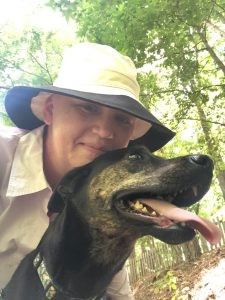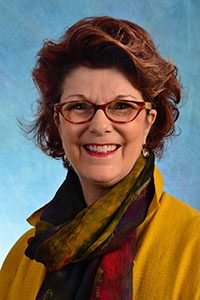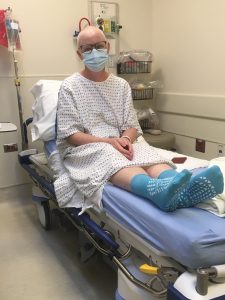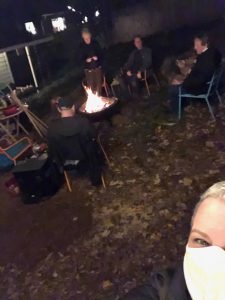Breast Cancer Treatment During COVID-19
Finding the Lump
COVID-19, a diagnosis that everyone understands and all that anyone can talk about these days. People are still staying home, staying in quarantine, wearing masks and trying to go about their everyday lives. For those diagnosed with another disease, the potential of contracting COVID-19 adds another layer of stress and required caution to the situation. It was hard enough to learn about her breast cancer diagnosis, but just as she started treatment, Brighid Willis, a 44-year-old Chatham county resident, was faced with a new worry: COVID-19 rushed on to the international scene and altered her plans.

During a routine self-breast exam in July 2019, Brighid found a lump in her breast. Aware of what it could mean, she immediately saw her doctor and scheduled a mammogram. She received a mammogram and an ultrasound; doctors diagnosed it as a cyst. Brighid had experienced a cyst ten years earlier that eventually went away. Relieved, she left it alone even as it continued to get bigger. Later in 2019, her doctor suggested she have it aspirated, meaning doctors would drain the breast cyst fluid. The procedure would help alleviate any discomfort or symptoms.
In February 2020, Brighid went back to UNC. Since her last test had been six months ago, the team felt it was best to do another mammogram and ultrasound. This time, doctors reviewed the images and concluded that it was not a cyst and did a biopsy.
Diagnosis and Creating an Individualized Plan

“On Valentine’s Day, I got the call telling me it was breast cancer,” recalls Brighid. “You can imagine the white noise that’s happening. I’m on the phone, in my office, at work by myself. Susan McKenney, a nurse I had seen when I went in for my tests, is the one who called with the frightening news. She did an excellent job of telling me what was going to happen without overwhelming me with information. I am just so appreciative of her. She was the one I interacted with when I was at my most scared. She was direct but kind; she had a sort of a tough mom vibe. I felt like somebody was holding my hand. That was phenomenal.”
As with all breast cancer patients, Brighid was assigned physicians, and a day-long list of appointments was set up for her to meet with her care team. Brighid was prepared for this step because of the help of her friend, Susan, a breast cancer survivor who had gone through her own journey at UNC in 2018.
“Susan had a slightly different type of breast cancer than me,” says Brighid. “She was super helpful and supportive through the whole process, explaining to me what to expect and laid out the process for me, helping me feel more prepared for what was to come. I would recommend that anybody who has this diagnosis find a friend who has gone through this experience because having Susan made a huge difference. While I hated that she had to go through it, having her by my side as part of my support system was huge.”
Brighid and her husband met with her care team, who walked her through their treatment plan. Her team included Ellen Jones, MD, PhD, Radiation Oncologist, Professor and Vice-Chair of Radiation Oncology. Katherine Reeder-Hayes, MD, MBA, MSc, Oncologist, and Associate Professor of Medicine. And her surgeon Kristalyn Gallagher, DO, Surgical Director of the Breast Care Program and Associate Professor of Surgery. Her team also included countless nurses and care staff who supported her through the entire process.

Brighid took notes throughout her daily appointment visits, but there was one visit when she didn’t write down a single word. “I didn’t take notes when we met with Dr. Gallagher because we were too locked in together. I didn’t want to look away to write anything down. She’s got an intensity to her, this energy that surrounds her. When you meet with her, you feel like you’re the only thing that she cares about. To have that demeanor, kindness, and warmth combined with her skills, I knew she was going to do a good job. She cares deeply about doing the best for her patients and making sure they’re well taken care of. To get this great combo of a lovely human being combined with an incredible surgeon was fantastic.”
When the day was over Brighid and her husband were armed with a plan. They had appointments set up for the coming months and the information they needed should additional questions come up.
“After that day, it was still scary, don’t get me wrong, but we felt better knowing there was a plan in place for me,” says Brighid. “Everybody spent a bunch of time with us answering all of our questions and concerns. I can still reference all the notes I took that day. Everything they said would happen happened. Here are the side effects. Here’s what you do when this happens. Here’s who you call if this happens. Everything was laid out for me, which was so helpful, and I felt like they were super well-coordinated in knowing me and taking care of me.”
Getting Treatment and a Change in Plans
Brighid started chemotherapy on March 9th. Her family also set up a plan for her chemo schedule. While her husband, Michael, attended the first round, Brighid’s parents were scheduled to fly in three weeks later for her second round. Her brother would come for the third round, and they were coordinating with the rest of her family for the remaining three rounds. However, things did not go according to plan. Soon after her first round of chemo, COVID-19 took a tight grip on the national stage and hasn’t let go yet. It forced her and her family to abandon their original plans. Her husband instead accompanied her to her appointments while her family and friends supported her from afar.

“My husband was a freaking trooper,” gushes Brighid. “He is a saint and a rock. He’s done it all with me. Round two of chemo looked very different from round one, including the mask restrictions and the added screening. I was just super mindful that I was getting outstanding care from everybody, but they, too, were dealing with the stresses of COVID-19. They have families, and they have lives and it added this whole layer of stress for everybody, but it never changed their level of care for me.”
After going through chemotherapy, the next step for Brighid was surgery. She and Dr. Gallagher had discussed the procedure. Brighid was scheduled for a lumpectomy, meaning Dr. Gallagher would remove the cancerous tumor along with a certain margin of normal tissue around the tumor to make sure she removed all of the cancer cells. Lumpectomies treat small, early-stage breast cancer tumors.

“I have to share a little anecdote because this just cracked me up,” recalls Brighid. “While prepping me for my first surgery, Dr. Gallagher walked me through what she was going to do, including explaining the risks. She told me that sometimes with lumpectomies, there is the possibility of leaving a dent, but that wasn’t likely to happen. She then left the room, and one of the surgical nurses came over and said, ‘Dr. Gallagher has to tell you that there could be a dent, but Dr. Gallagher doesn’t leave dents; you’re going to be fine.’”
After the surgery, the removed breast tissue was sent to pathology. Brighid came in for a follow-up visit with Dr. Gallagher, and they discussed the results. Dr. Gallagher explained, that the cancer had been removed during surgery, but cancer cells were touching one of the edges of the removed tissue (known as a positive margin). Because of this, Brighid had to return to the operating room to take a little more tissue from that area to ensure all of the cancer cells had been removed.
Once her second round of pathology came back clear, Brighid moved on to her treatment plan’s next stage, 20 days of radiation. “I will tell anyone that will listen to me that radiation therapists are the world’s nicest human beings,” says Brighid. “Radiation is really scary and vulnerable, and yet as much as I didn’t want to do it every weekday for 20 days, the people made it so lovely. From the people that greet you in the front and take your temperature through the therapists and the doctors, it was so smooth and a much better experience than I had anticipated.”
Recovery and Support
With radiation complete, Brighid is on the path to recovery, a breast cancer survivor. The next year will be filled with follow-up visits every three months. Oncology will be twice a year, while surgery and radiation will be once a year to check up on her and track her progress.

When thinking about her medical journey, Brighid shares her thanks to the entire team of people who came together to care for her. “I’m really grateful,” says Brighid. “I know for a lot of women, a lot of cancer patients in general, COVID-19 has been an interrupter to care. I’m very appreciative to UNC that that was not the case for me. I feel very lucky that I was able to follow my original plan because that would have been really mentally hard. I’m also very thankful for the outpouring of love and support that I received during this time from family, friends, and coworkers. I was super overwhelmed by the outpouring of support. I mean, I’ve gotten care packages and flowers and cards. I think people were especially mindful because we were on lockdown and couldn’t see anyone. I appreciated their thoughtfulness and care in a very isolating and scary time.”
